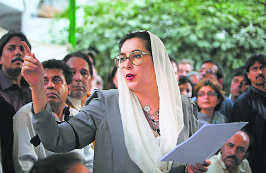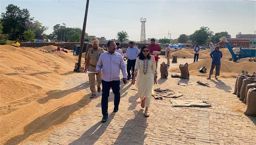
Deja vu: Benazir was always conscious of her family's similarity with the Gandhis. Above: Two months before her death in Karachi in October 2007; (and below) at Chandigarh airport in July 1972 photo:AP
Karan Thapar
It was during her years of self-exile in London that my university friendship with Benazir Bhutto matured into a stronger and closer bond. This was helped by the fact that I was married by then, and Benazir and Nisha grew to like and understand each other.
***
Benazir had decided to return to Pakistan. She had realized that she couldn’t put off doing so for much longer. Exile in London was diminishing the contact she valued with her people. But more than that, I suspect, there was the challenge to prove that she could take on a dictator and get Pakistan to support her the way the people had stood by her father in the 1960s, when he had taken on Field Marshal Ayub Khan who was the military dictator at the time. Benazir knew that she had to confront a similar challenge and win.
***
Benazir chose to fly home via Saudi Arabia. She did this for two reasons. First, she wanted to pay her respects at Mecca. Equally importantly, she wanted to land in Lahore rather than Karachi. And in those days the only international flight to Lahore was Saudia (Saudi Arabian Airlines) from Riyadh. The reason Lahore was so important wasn’t immediately clear to me. ‘I have to make a mark in Punjab to prove to the country that I have popular support,’ Benazir explained.
...She knew her future depended on it. When the plane landed, Benazir said that she kept peering out of the window only to find the airport silent and deserted. This didn’t feel like a rapturous welcome. Her heart began to sink. ‘Is my political career over before it’s even started?’ was the question she kept asking herself. There were three people at the bottom as she climbed down the stairs. Beyond them stretched empty space and an eerie silence. It was shortly after dawn, but there seemed to be no signs of life at the airport. ‘Bibijaan,’ one of the three said to her, ‘the authorities have not allowed anyone to enter the airport but there are millions outside waiting for you.’ It took Benazir eighteen hours to drive from the airport to the Minar-e-Pakistan in the centre of Lahore, a journey that should have taken no more than half an hour. It seemed as if the whole city — perhaps even the entire province — was out on the streets to welcome her home. In the weeks that followed, such displays of mass support for Benazir were repeated in Quetta, Islamabad and Karachi. By then it was clear that Gen. Zia’s nemesis had arrived and captured the love and support of the Pakistani people.
***
As a young politician, in the years after her father’s cruel hanging, she had often consciously modelled herself on Indira Gandhi. I remember her fascination for the traditional Indian namaste. ‘It’s dignified, friendly but not familiar,’ she once said. I suspect the adab that she made her personal greeting was, in her eyes, an equivalent. In 1984, when Maqbool Butt was about to be hanged, Benazir wrote to Indira Gandhi, pleading he be saved. ‘Why are you doing that?’ I asked. I couldn’t understand her need to write the letter. I thought it was a mistake. ‘I have to, Karan,’ she explained. ‘I’ve lived through my father’s hanging and I know the trauma it created for the family. I can’t watch someone else go through the same misery without doing what I can to prevent it.’ Indira Gandhi never replied but Benazir didn’t hold that against her. As a Bhutto daughter, Benazir was always conscious of her family’s similarity with the Gandhis. After Sanjay Gandhi’s plane crash and Indira’s assassination in the early 1980s were followed by her brother Shahnawaz’s mysterious death, she once commented that there was a curse on both families. At the time, Rajiv’s killing and her own were still far in the future. Today, there can be no doubt about that curse.
***
During the Bharatiya Janata Party (BJP) years, Benazir forged a link with the Advani family with the same facility and friendship as with Rajiv. A few months after her first meeting with L.K. Advani, we were together in Washington for the annual National Prayer Breakfast in 2002. During a break in one of the sessions, she insisted that I accompany her for shopping. ‘But we’re walking, okay? I need the exercise and so do you!’ As we sauntered down Connecticut Avenue, she stopped outside an old-fashioned bookshop. Minutes later, she bought a Robert Kaplan paperback as a gift for Advani. I carried it back to Delhi. It was the first of several similar gifts she sent him. I know that as prime minister, her two terms in office disillusioned many. Her fans were disappointed while her critics felt justified. But between 1989 and 2007, the change that characterized her attitude towards India, and Kashmir, in particular, progressed steadily and didn’t falter. From the young prime minister who would shout ‘Azadi, Azadi, Azadi!’ on television, she became the first, the most consistent and perhaps the strongest proponent of a joint India–Pakistan solution to Kashmir. As early as 2001, she began to speak about soft borders, free trade and even, perhaps unrealistically, a joint Parliament for the two halves of Kashmir. General Pervez Musharraf’s concept of self-governance and joint management drew heavily upon her thinking.
***
When I last interviewed her in September 2007, days before her return to Pakistan, she went further than ever before. Not only did she forcefully repeat her commitment to clamp down on all private militia and shut terrorist camps but, in addition, she promised to consider the extradition of Dawood Ibrahim and even the possibility of giving India access to men like Lashkar-e-Taiba supremo Hafiz Muhammad Saeed and Jaish-e-Mohammad founder Masood Azhar. In private conversations, she would readily admit that the strident prime minister persona of 1988–89 was a mistake. In fact, once she even came close to saying as much on television. Had she lived to become prime minister for a third time, I feel certain she would have fulfilled her commitment to improve India–Pakistan relations. Two months before her death, we met in Dubai. She was planning a second homecoming. When I asked if she could repeat the miracle of her first return, she shot back with the question, ‘Why do you ask?’ I told her that she was now fifty-four, had been prime minister twice, disappointed many and that Pakistan was a very different country these days. She heard me out in silence and then softly smiled. Her eyes seemed to take on a knowing but playful look. When she spoke, her words sounded measured and well considered: ‘It will be an even bigger return home.’ In fact, it was explosive. She was clearly poised for a huge victory. Sadly, death snatched it away. But I doubt whether Benazir would have wanted to die of old age. Instead, she died a hero, a martyr and an inspiration for many.
— Excerpted with permission from the publisher



























